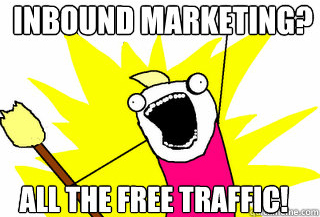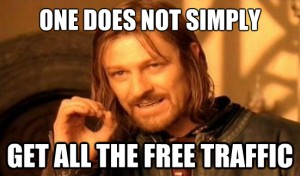The Golden Age Of SEO
I’m a fan of SEO. Search engine optimization. Ah, yes. Just writing it makes me happy. It’s what I do. It’s my calling. I can’t think of anything in the past decade that has kept me more enthralled and engaged… besides my wife of course. In the past few years, my interest in SEO has […]
I’m a fan of SEO. Search engine optimization. Ah, yes. Just writing it makes me happy. It’s what I do. It’s my calling. I can’t think of anything in the past decade that has kept me more enthralled and engaged… besides my wife of course.

In the past few years, my interest in SEO has accelerated even more, as the SEO industry has expanded to include everything from social media and conversion optimization to reputation management and a myriad of specialized tools that seemingly measure every click ever made on the Internet.
To make things even more fun, we have gone from traditional SEO, which specifically looks at organic traffic, to inbound marketing, which involves driving free traffic from any and all possible sources. People can’t help but get mesmerized by ALL THE FREE TRAFFIC!
While I still wake up every day and get super-duper excited about optimizing my clients’ sites/media/businesses, I often find myself reminiscing about the old days of SEO.
For me, the past 10 years will be remembered as the Golden Age of SEO. It really was an amazing era. Basically, everyone was following a simple, straightforward list of SEO best practices.
For most of my e-commerce clients, the 7 Keys to SEO success were:
- Write optimized title tags
- Write optimized meta description tags
- Write optimized H1 tags (page headers)
- Optimize internal navigation (main nav, breadcrumbs, sidebar nav, footer links, etc.)
- Optimize and utilize any content unique to the site (blogs, videos, PDFs, forums, etc.)
- Grow/buy some links (and be smart about it!)
- Over-communicate with your client(s)
Don’t get me wrong: there were a lot more than 7 steps in an SEO campaign.
But from 2000-2009ish, if you followed those 7 steps, you were probably very successful at whitehat SEO for e-commerce websites. It worked like a charm.
I reversed negative year-over-year organic search sales trends for several massive brands. I had numerous clients that experienced 100%+ year-over-year growth in organic search traffic during the holidays. I could pretty much take any e-commerce website to higher levels of organic traffic and revenue. In fact, it was not atypical to see ROI in the area of 50:1.
But, alas, these SEO strategies were not unique to me. These methods worked for a lot of SEOs. Back in those days, everyone could win at SEO. It truly was a golden age. And in my opinion, Google was begging for better SEO for all websites.
After all, better SEO makes things easier for Google, and it helps them find and return more relevant results. Even Google was enjoying the growth of marketing directors pumping more and more money in SEO.
During the Golden Age of SEO, you could go to any number of search conferences and listen to some of the world’s best SEOs publicly brag about whitehat and grayhat methods that worked. Bloggers were also posting about whitehat and grayhat SEO methods that worked.
At the same time, everyone was handing out new methods for free, the team at Google Analytics was really pushing hard to make their product competitive with the most popular third-party tracking software, such as Omniture and Coremetrics (both of whom were also taking tracking and analytics to new heights of customization and granularity). It was a time when successful methods were being shared freely, and it was getting progressively easier to provide extremely detailed reporting to clients.
It was also a great time to be an SEO account manager at a search agency. I could write an SEO audit, work with the client’s in-house development team or third-party design agency, schedule all my recommendations into their IT calendar, and communicate with clients via highly-detailed reports. Clients knew that SEO took time to deliver results, so it was perfectly fine to make small gains each month and keep my clients satisfied and happy.
Over the course of the campaign, all of those small wins would add up to big results! And as I worked with the various teams, I effectively taught the basics of SEO to everyone I worked with. Sometimes people get bored with their jobs, so learning new stuff was fun for them. And I like to teach, so it worked out really well for both parties.
Sure there were some difficult aspects of being an SEO during this time. For example, it was a pain having to fight for resources from the development teams to get my recommendations implemented. Another tough issue was working with clients who did not have accurate organic search data. But all in all, basic SEO strategies worked, new SEO methods were freely shared, and search data was getting more comprehensive and easier to obtain (and it was getting more granular!).
And Then… The SEO Game Changed
In 2009 (or so), I began to notice SEO going underground. Remember those SEO conference bragging sessions I mentioned earlier, where the experts would share their secret strategies? Well, those started turning into Q&A sessions and site reviews. And remember all those bloggers who were writing about whitehat methods that worked for SEO? Well, those wells dried up…and some of them just started going full-on blackhat.
Also, the market was getting more and more saturated with SEOs. Almost all notable e-commerce websites were now doing SEO. At the same time, Google was changing universal search to include local results, news results, shopping results, video results, image results – all of these results were now taking up prime spots in the SERPs.
Then, social media really hit, and the next thing we knew, we were seeing real-time results in the SERPs. It was complete and total convergence of all things Internet.
Today, we are surfing an Internet where nearly everyone is doing SEO. When I look at the Top 30 results for pretty much any keyword, I see 30 websites that are doing SEO with some level of expertise. I see shopping results, news results, social results, image results, and social results that have all been optimized for that keyword. It’s very competitive out there.
Furthermore, companies that design platforms and content management systems have also embraced SEO. Most modern CMS and platform backends have areas dedicated to SEO settings and features, meaning that most new websites come with standard SEO best practices out of the box. This means that a lot of companies who are not actively “doing SEO” now have websites with basic SEO strategies in place.
Also, e-commerce VPs and marketing directors are more knowledgeable about SEO, as many of them have experience with SEO agencies. It’s not out-of-the-ordinary for new clients to bring up rel-canonical tags, rel-author tags, the open graph, and 301 redirect strategies – during our campaign kickoff calls. The times really have changed!
And how about today’s data? On one hand, we have lost some data. Yahoo shut down SiteExplorer. Google Analytics is now withholding organic search keyword data from logged-in visitors. (see, 2011: The Year Google & Bing Took Away From SEOs & Publishers).
But on the other hand, there are so many great resources for SEO-related data: SEOmoz, SEMrush, MajesticSEO, RavenTools, AHREFs, AuthorityLabs…the list goes on and on. Sure, these are paid tools and services, but so what?
Data-based decision making makes the SEO world go ’round. So we’ve got to have data. Those services are very helpful for competitive analysis, link building, checking rankings in the SERPs, site monitoring, etc. – I would have loved to have all of these tools 10 years ago!
On the social media optimization side of things, there are social media analytics and monitoring services popping up left and right.
So here we are in 2012: Everyone is doing SEO. Every market is competitive. Google and Yahoo are taking data away from us while new SEO tools and softwares are launching every day. And for most SEOs, the role of an SEO has expanded to that of an inbound marketer. It’s not enough to only know about strategies that drive traffic from search engines.
Nowadays, if you want to compete as an SEO expert, you need to stay up-to-date with local SEO, mobile SEO, social SEO, and anything new on the horizon.
Further, the economy of the past 4-5 years has changed the demands of clients. Showing small wins every month is not enough. Cash-strapped clients are cutting marketing budgets, and many of them are all looking at SEO as a way to get the best bang for the buck. And they want awesome results in the first month. As an SEO in 2012, I’ve got to deliver big results – yesterday!
It really is a fascinating time to be in the SEO business. There have never been so many different ways to drive free traffic to your websites. Perhaps I misstated before.
Perhaps *this* is the Golden Age of SEO. We’re smarter as marketers. Our clients are smarter with their budgets. We’ve been around the block a few times. We know what works, and the Internet seems to be changing faster than ever before (Google SPYworld, Twitter Brand Pages, Pinterest, etc..). It’s challenging. It’s always required effort and a smart approach. It’s not easy. But SEO is still SEO. It’s about content. It’s about links. It’s about connectedness. It’s about data and, most importantly, about driving results.
Let’s enjoy this age!
Featured image from istockphoto, used under license.
Related Articles
- What Is SEO / Search Engine Optimization?
- What Is Search Engine Optimization? The Three Minute SEO Video!
- Periodic Table Of SEO Ranking Factors
- Search Engine Land’s Guide To SEO
Contributing authors are invited to create content for Search Engine Land and are chosen for their expertise and contribution to the search community. Our contributors work under the oversight of the editorial staff and contributions are checked for quality and relevance to our readers. The opinions they express are their own.
Related stories


